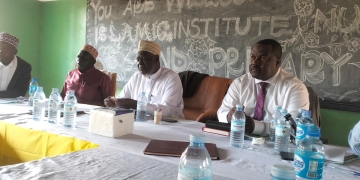KAMPALA-On Wednesday, Uganda joined the rest of the World to celebrate the UN day in support of Torture Victims under a theme “Torture-Free Communities, For All By All.”

At the event held in Kampala at Railways Grounds in Kampala, various stakeholders expressed worry about the Increasing cases of torture in the country to the extent that most of the victims are not ready to report the perpetrators for fear of what could happen next.
“Its unfortunate that majority of the citizens now have normalized cruel or inhumane degrading treatment against their colleagues. Many of these capture videos while harassing their tormentors and later on these videos are posted on social media platforms.” remarked Uganda Human Rights Commission Chairperson, Mariam Wangadya at commemoration event in Kampala.
She also added that some people think its only security personnels who torture or violates people’s rights when even themselves are culprits of the vice
“In most homes, maids are always assaulted, have their salaries cut by their bosses as a result of minor excuses, many married women are publicly floggged by their husbands on allegations that they committed adultery. Some boda riders undress and force their colleagues to shower in public that they smell badly which is in total violation of their rights.”

She also called upon members of the community and stakeholders to play their part by creating awareness on the dangers of human rights violations in various parts of the country.
“I commend the Uganda Police for its efforts in ensuring that human rights violators are arrested and charged before competent courts of law.”
Bernard Oundo, the President of Uganda Law Society, expressed the need for increased sensitization campaigns among Ugandans because majority are not aware of their rights as well as the importance of observing them.
“The day like this is very key in creating awareness among the masses, if we are to achieve a torture free community as we intend to do, citizens must be equipped with knowledge that can enable them to separate the Right to be free from torture on other rights.”
He also commended the coalition against torture led by African center for Treatment and Rehabilitation of Torture Victims (ACTV) and Uganda Human Rights Commission for your efforts in advocating for Uganda’s ratification of the UN convention against torture, inhumane and degrading treatment.
“Torture is not a problem to only victims and perpetrators, but it’s a threat to our communities , it’s a call for all of us to educate the people to ensure that the laws against torture are put into their intended use.” Oundo added
The Director of Public Prosecutions (DPP), in her message read by her representative Barbara Kauma, expressed the need to fast track the Witness protection law so that people can be able to report cases without fearing that their perpetrators may revenge on them.
“Let all of us play our roles in eliminating this vice like Police , investigators, Civil Society and Prosecutors to hold all the perpetrators accountable.”
Rev. Canon Augustine Musiwuufu Magala, ACTV Board Member, commended the members of the general public and other partners for having turned up in large numbers. “we therefore propose for consecutive efforts by state and Non State Actors and civil society to consider the enactment of witness protection bill 2015 to enable the public report all cases of torture without any threat.”

Kyomya Williams, The National Coordinator Torture survivors Association of Uganda, dealing with people who have under went torture noted that there is a need to sensitize communities in order to render the required support to victims than stigmatizing them.
“Currently, We have over 100 members who have been victims of torture and the number continue to increase every day that passes. Many of these when they go back to their communities, people tend to look at them as criminals and fear to associate with them in fear that they could also be arrested as suspects in the same cases which is not true.”
He added that they support victims by equipping them with business knowledge and skills but they still have a challenge of limited resources which has greatly affected most of their programs.
ACTV team provided medical-psychosocial clinic services , teams from Uganda Law Society and Chapter 4 also offered legal aid and pro bono services to torture victims.










